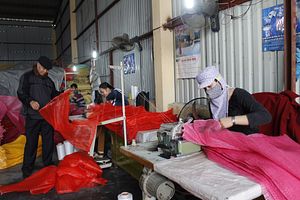As negotiations for the Trans-Pacific Partnership (TPP) agreement take place behind closed doors in Hanoi from September 1 through 10, the TPP issue is becoming increasingly controversial in Vietnam. An intense domestic debate provides multiple lines of thought. One thing is certain, although not overtly discussed: the “China factor.” It is in fact an indispensable element of economic and political discourse revolving around Vietnam’s TPP accession. For certain analysts, it is either a driving force or a source of friction for the evolving nature of relations between these two neighbors cum comrades.
Domestically, the Vietnamese elite and scholars are debating the need for an urgent and dramatic shift, both in Vietnam’s distinctive growth model and its strategic approach, in order to seek a balanced position between great powers in the region.
The Logic of the TPP
In the last few years, Vietnam has been especially sensitive to Chinese economic and trade predominance. The trade balance between Vietnam and China has consistently been in China’s favor, and Vietnam’s trade deficit with China has ballooned. Unprocessed goods, such as crude oil and coal, account for a significant portion of Vietnam’s exports to China. Meanwhile, Vietnam’s manufacturers, even export-centric ones, are becoming more reliant on Chinese inputs. Imported Chinese goods encompass various essential materials for export-specific production, including raw materials, machinery and equipment, steel, chemicals, oil and fabrics. One of the most popular reasons given is the asymmetrical North-South divide between their economies, a serious concern for Vietnam.
That is an important reason why the TPP is significant in Vietnamese eyes. Since the first round of negotiations in 2009, the TPP has been regarded as a means for securing Vietnam’s economic interests vis-à-vis China. Hanoi worries that China’s size, geographic proximity, and mercantilist policies will harm Vietnamese economic development. In the shadow of the dragon, the concern that Vietnam’s core industries could be wiped out or at least dominated by Chinese companies is becoming very real.
However, Vietnam may be able to compensate for its trade deficit with China through a surplus in trade with TPP members, especially the U.S. It could also have a spill-over effect in the form of deeper cooperation in areas such as intellectual property, services and investments. That suggests TPP membership is the best bet for Vietnam at the moment, helping it to expand its export market and indirectly mitigating the unfavorable trade balance vis-à-vis China.
Still, the benefits would be far from certain. Take the textiles, garment and footwear industries, for example. Vietnam’s competitiveness in large markets such as the U.S. should give it comparative advantages over China. Yet the TPP’s rules of origin, namely the “yarn forward” rule, put the benefits in question. Vietnam’s supply chain is heavily dependent on Chinese inputs, which could disqualify Vietnamese garments makers from access to zero tariffs under the TPP. Vietnam could turn to other suppliers within the TPP, but none can match China on price. For the short term, at least, it will be unrealistic for Vietnam to expect an immediate decline in its reliance on the Chinese market.
‘Soft Balancing’
For those who believe that the TPP is not only an economic but also a political and strategic FTA, the economic benefits are ancillary. In the wake of the ongoing power shift within the region, the TPP is also considered by the Vietnamese elite and scholars as a “soft balancing” strategy against China’s growing assertiveness. The constantly fluctuating strategic environment has put Vietnam in a difficult position, especially in regards to recent incidents in the South China Sea.
In fact, the debate among Vietnamese pundits goes even further, with some arguing that the TPP is the most appropriate framework for the time being to propel Vietnam-U.S. relations both bilaterally and multilaterally. That may be reasonable. There are still several impediments to closer ties between Vietnam and the U.S. For one, Vietnam’s political affiliation with China is still a consideration. The long-time “Three No’s” – Vietnam’s non-alliance policy – are also an issue. This is where the TPP comes in as a “softer,” multilateral approach, which focuses more on trade to help minimize unexpected consequences.
Yet despite repeated calls for progress, the outlook for promoting U.S.-Vietnam bilateral relations via the TPP is very murky, as is the chance of using the trade bloc as a “soft alliance” against China. The negotiation process has been sluggish, with multiple missed deadlines. The process has put the plausibility of the TPP into some doubt, which is probably why a Vietnam-U.S. bilateral channel has been re-booted over the last couple of months. The TPP could have a profound impact on Vietnamese politics, but for now it remains hypothetical.
Truong-Minh Vu is a Ph.D. Candidate at the Centre for Global Studies, University of Bonn (Germany). Nguyen Nhat-Anh is an associate research fellow at the Faculty of International Relations, University of Social Sciences and Humanities, Ho Chi Minh City, Vietnam.

































